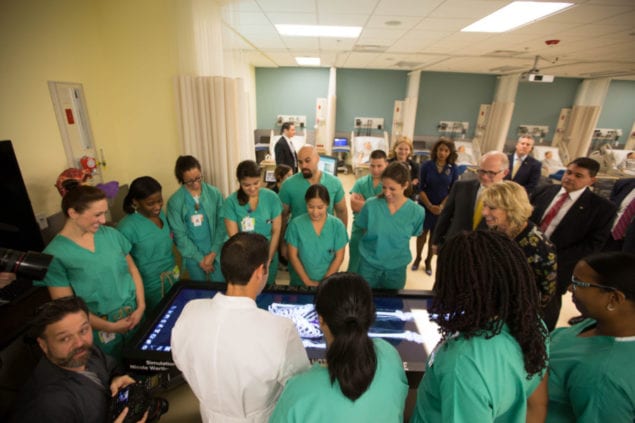President Mark B. Rosenberg wrote the following op-ed in the Miami Herald on April 17. Rosenberg reflects on Secretary of Education Betsy DeVos’s visit to FIU earlier this month.

Florida International University had the rare opportunity this month to inform, and possibly influence, education policy and funding at the national level when U.S. Education Secretary Betsy DeVos visited FIU and other educational institutions in South Florida.
DeVos chose to visit FIU because she’s aware of the positive things that we are accomplishing through collaboration, innovation and a wide range of educational options.
Together with Miami-Dade Public Schools Superintendent Alberto Carvalho, I explained to DeVos that we believe our success at FIU and as a community is tied to our public schools, where we have innovative programs to foster a college-going culture and help students earn college credit while in high school. These programs help students succeed and graduate on time. This saves families money and allows young people to jump into their careers in a timely manner.
We also discussed the critical role Pell Grants play in our community. This federally funded form of financial aid helps the neediest students get through college. At FIU, approximately 60 percent of our students depend on Pell Grants. Some years ago, we lost Pell Grant support for summer classes — a $10 million blow to our students. I asked DeVos to support us in asking Congress to bring back funding for summer Pell. Our students — at FIU, Miami Dade College and elsewhere — have much to gain from being able to get through college in four years with minimal debt. We made sure the secretary understood that we are not a rich community, but we are a hardworking community that has a record of success, innovation, and entrepreneurship.
We pointed to the success we are having in teaching science, technology, engineering, and math (STEM), with support from a Department of Education grant, which allowed us to build our Mastery Math Lab. Over the past few years we have reinvented the way we teach a number of courses that were keeping too many of our students from progressing toward their degrees. We have integrated learning assistants, we have created new learning environments, and our students are realizing the benefits of evidence-based innovation. At FIU, we are changing the way science is taught, and in doing so, we are including more women and minorities, which benefits science, South Florida, and the global community.
During her visit, DeVos met Idaykis Rodriguez, who came to Miami from Cuba as a child, graduated from our public school system, studied at FIU, and ultimately earned a doctorate in physics. Rodriguez studies the way physics is taught and learned. She is part of the team at the STEM Transformation Institute that is creating a new model for teaching science.
DeVos had an opportunity to meet several of our students as well, including Tabitha Gonzalez, who was diagnosed with leukemia as a child and was treated at Nicklaus Children’s Hospital. She has been in remission for 16 years, but her experience left her with a passion for pediatric nursing. When she asked her favorite nurses where she should go to become a nurse, the answer was FIU.
The secretary met Tarku Menderu, an Ethiopian doctor who is in a special program designed to retain talent and offer opportunities to foreign doctors who want to work in the United States as nurses.
I discussed with DeVos the importance of keeping our nation open to talent from other countries and was pleased to hear her reiterate the administration’s position that Deferred Action for Childhood Arrivals (DACA) students are not targets for deportation.
Everyone whom DeVos met at FIU sent a clear message through deeply personal stories: This first- and second-generation immigrant community is thriving and has important contributions to make to our nation in the areas of discovery and education. I am confident that she will use what she learned here to inform her decisions, support innovation and help replicate success in diverse communities across the country.






